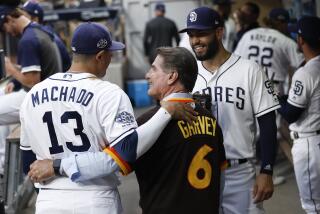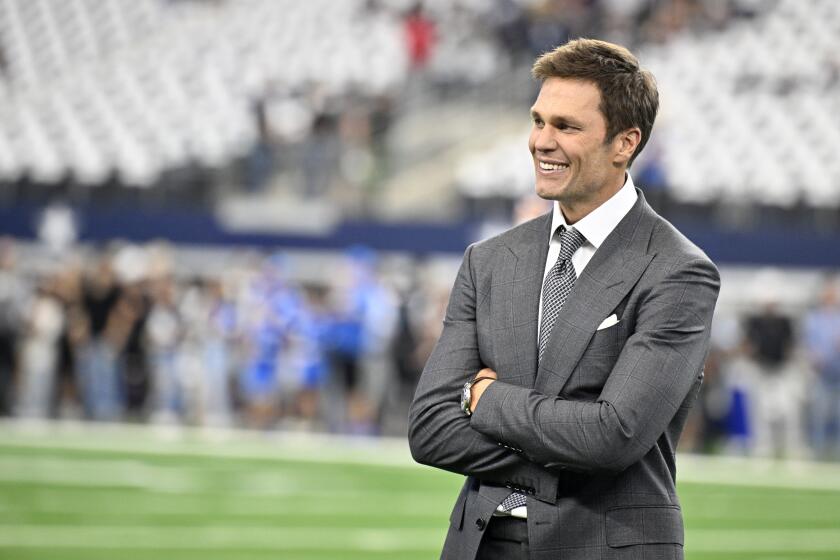Selig Doesn’t Dodge Controversy on D.C. Team
WASHINGTON — Commissioner Bud Selig was in town Tuesday to speak at the National Press Club on the “State of Baseball.” Since Selig got a free meal (and nobody threw rotten vegetables), you’d think he might have tossed a bone to Washingtonians. Especially since those in the room included many who’ve been involved for years in trying to get a team for Washington or Northern Virginia.
To the commissioner’s credit, he didn’t take the easy way out, as he sometimes has in the past. For 29 years, it’s been traditional for baseball brass, not just Selig, to put an optimistic spin on our chances, encourage our commissions and ownership groups. Why not? It’s been in baseball’s interests to tease us. Who knows, some decade they might find a use for the capital of the free world.
Tuesday, Selig talked straight instead of sugar sweet. After admitting that, if he walked down the streets of Washington, he’d probably be booed, Selig emphasized that he had “no personnel animus . . . no animosity” toward Washington.
For once, he didn’t imply he was Washington’s friend though, as always, he played the harp about how he feels our pain since his beloved Braves were stolen long ago by Atlanta. A Northern Virginia fan asked Selig if, someday, big league baseball might be closer to him than a two-hour drive to Baltimore. Answer: Don’t hold your breath.
“A two-hour drive is not unusual these days in some places (to attend a big league game). . . . Fans of the Cardinals and Rockies come from all over,” said Selig, who might have mentioned several other towns like Boston and Cincinnati. “Baseball has become a regional game. It needs to be regional in most places.”
Saying the word “regional” to a Washington fan is like pointing a crucifix at Dracula. We recoil in horror. Selig also added, “I am protective of other franchises. . . . I’m not going to make the mistakes we’ve made in the past.” That’s often taken to be baseball code for comparing Baltimore-Washington to Oakland-San Francisco-i.e., not quite a big enough market for two really healthy teams.
These days, Selig deserves more than customary sympathy, even from a town that’s waited 29 years for a team. He has big problems on his mind. (Seriously.) This is no time to give Baseball for Washington a high priority. And he isn’t. Only one issue is on the commissioner’s plate, promulgating the conclusions of the Commissioner’s Blue Ribbon Panel on Baseball Economics. After 131 years of mulling it over, baseball has decided, in the words of the report, that “Sports leagues do not function as free markets . . . [They] are blends of cooperation and competition--cooperation for the sake of producing satisfactory competitiveness.”
The NFL figured this out 40 years ago. People like the late Orioles owner Edward Bennett Williams were preaching revenue sharing--in vain--20 years ago. For just as long some of us have banged the drum that baseball needs to share all revenues. It takes two teams to make a game. If the Yankees hold an inter-squad contest, let them keep all the proceeds. But as long as they’re playing somebody else, they should be splitting 50-50.
The more equal team revenues become, the less likely that a few rich clubs will create an inflationary salary spiral with crazy free agent bids. It’s simple. And, after 20 years of arguing about it, baseball finally sees the light.
Maybe. That is, if Selig can get enough votes to push through the kind of NFL- and NBA-like revenue sharing that the Blue Ribbon boys suggest: “at least 40 percent, and perhaps as much as 50 per cent, of all clubs local revenue . . . “
Selig needs the support of at least a few rich teams if he wants to make this plan palatable. “The poor teams could just outvote the rich teams,” said one prominent baseball insider Tuesday. But it would be so much nicer if there were consensus, like the stunning 30-0 vote that Selig extracted from the owners to share all future Internet revenues equally.
Which rich-market owner has been most vocal in supporting revenue sharing? Which “Quartile I” owner is ready to lock arms with Bud to save the fragile economics of the game? Just our luck: Peter Angelos.
The Orioles owner has always been progressive on labor-management issues. At times, he was the lone sensible ownership voice in ’94. Also, revenue sharing goes down easily in his Democratic circles, unlike many conservative baseball owners.
So, with baseball’s labor contract running out after the 2001 season and Selig valuing Angelos support, perhaps you can now grasp why the word “regional” has cropped up more frequently in the commissioner’s vocabulary and why two-hour drives from Northern Virginia to Baltimore no longer seem so inconvenient.
Has Selig traded Washington to Angelos in return for the Oriole owner’s support on those twin touchy issues in the Blue Ribbon report: revenue sharing and a possible “50 percent luxury tax” on the payrolls of rich teams?
No, no, a thousand times, no. And you have the commissioner’s word on it.
“Each issue is separate,” said Selig Tuesday. “I owe that [independence] to the sport.”
Let’s hope so. After baseball’s next labor negotiation is complete, hopefully before the 2002 season, priorities may change and allegences may even shift. Who knows where the “good of the game” may lie? Perhaps putting a team in or around the nation’s capital might seem self-evident then.
Until a new labor contract is signed, we shouldn’t kid ourselves. Bud Selig and Peter Angelos are locked in a marriage of convenience -- one that leaves Washington locked out. However, for 25 years, Selig has been a flexible and pragmatic man. Interests change, including those vague “best interests of the game.” Selig usually changes with them.
Someday, don’t rule out a divorce of convenience.
More to Read
Go beyond the scoreboard
Get the latest on L.A.'s teams in the daily Sports Report newsletter.
You may occasionally receive promotional content from the Los Angeles Times.










